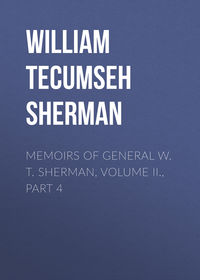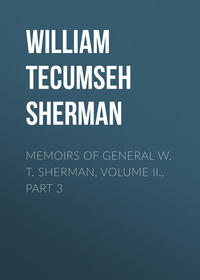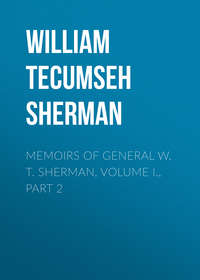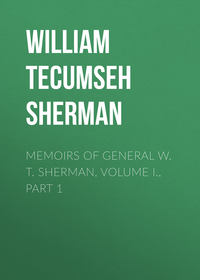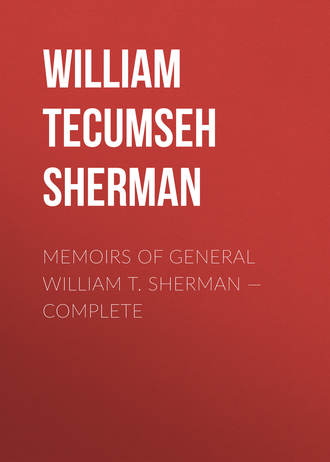 полная версия
полная версияMemoirs of General William T. Sherman — Complete
Labor was very scarce, expensive, and had to be economized. The mill was built over a dry channel of the river which was calculated to be the tail-race. After arranging his head-race, dam and tub-wheel, he let on the water to test the goodness of his machinery. It worked very well until it was found that the tail-race did not carry off the water fast enough, so he put his men to work in a rude way to clear out the tail-race. They scratched a kind of ditch down the middle of the dry channel, throwing the coarser stones to one side; then, letting on the water again, it would run with velocity down the channel, washing away the dirt, thus saving labor. This course of action was repeated several times, acting exactly like the long Tom afterward resorted to by the miners. As Marshall himself was working in this ditch, he observed particles of yellow metal which he gathered up in his hand, when it seemed to have suddenly flashed across his mind that it was gold. After picking up about an ounce, he hurried down to the fort to report to Captain Sutter his discovery. Captain Sutter himself related to me Marshall's account, saying that, as he sat in his room at the fort one day in February or March, 1848, a knock was heard at his door, and he called out, "Come in." In walked Marshall, who was a half-crazy man at best, but then looked strangely wild. "What is the matter, Marshall!" Marshall inquired if any one was within hearing, and began to peer about the room, and look under the bed, when Sutter, fearing that some calamity had befallen the party up at the saw-mill, and that Marshall was really crazy, began to make his way to the door, demanding of Marshall to explain what was the matter. At last he revealed his discovery, and laid before Captain Sutter the pellicles of gold he had picked up in the ditch. At first, Sutter attached little or no importance to the discovery, and told Marshall to go back to the mill, and say nothing of what he had seen to Mr. Wimmer, or any one else. Yet, as it might add value to the location, he dispatched to our headquarters at Monterey, as I have already related, the two men with a written application for a preemption to the quarter-section of land at Coloma. Marshall returned to the mill, but could not keep out of his wonderful ditch, and by some means the other men employed there learned his secret. They then wanted to gather the gold, and Marshall threatened to shoot them if they attempted it; but these men had sense enough to know that if "placer"-gold existed at Coloma, it would also be found farther down-stream, and they gradually "prospected" until they reached Mormon Island, fifteen miles below, where they discovered one of the richest placers on earth. These men revealed the fact to some other Mormons who were employed by Captain Sutter at a grist-mill he was building still lower down the American Fork, and six miles above his fort. All of them struck for higher wages, to which Sutter yielded, until they asked ten dollars a day, which he refused, and the two mills on which he had spent so much money were never built, and fell into decay.
In my opinion, when the Mormons were driven from Nauvoo, Illinois, in 1844, they cast about for a land where they would not be disturbed again, and fixed on California. In the year 1845 a ship, the Brooklyn, sailed from New York for California, with a colony of Mormons, of which Sam Brannan was the leader, and we found them there on our arrival in January, 1847. When General Kearney, at Fort Leavenworth, was collecting volunteers early in 1846, for the Mexican War, he, through the instrumentality of Captain James Allen, brother to our quartermaster, General Robert Allen, raised the battalion of Mormons at Kanesville, Iowa, now Council Bluffs, on the express understanding that it would facilitate their migration to California. But when the Mormons reached Salt Lake, in 1846, they learned that they had been forestalled by the United States forces in California, and they then determined to settle down where they were. Therefore, when this battalion of five companies of Mormons (raised by Allen, who died on the way, and was succeeded by Cooke) was discharged at Los Angeles, California, in the early summer of 1847, most of the men went to their people at Salt Lake, with all the money received, as pay from the United States, invested in cattle and breeding-horses; one company reenlisted for another year, and the remainder sought work in the country. As soon as the fame of the gold discovery spread through California, the Mormons naturally turned to Mormon Island, so that in July, 1848, we found about three hundred of them there at work. Sam Brannan was on hand as the high-priest, collecting the tithes. Clark, of Clark's Point, an early pioneer, was there also, and nearly all the Mormons who had come out in the Brooklyn, or who had staid in California after the discharge of their battalion, had collected there. I recall the scene as perfectly to-day as though it were yesterday. In the midst of a broken country, all parched and dried by the hot sun of July, sparsely wooded with live-oaks and straggling pines, lay the valley of the American River, with its bold mountain-stream coming out of the Snowy Mountains to the east. In this valley is a fiat, or gravel-bed, which in high water is an island, or is overflown, but at the time of our visit was simply a level gravel-bed of the river. On its edges men were digging, and filling buckets with the finer earth and gravel, which was carried to a machine made like a baby's cradle, open at the foot, and at the head a plate of sheet-iron or zinc, punctured full of holes. On this metallic plate was emptied the earth, and water was then poured on it from buckets, while one man shook the cradle with violent rocking by a handle. On the bottom were nailed cleats of wood. With this rude machine four men could earn from forty to one hundred dollars a day, averaging sixteen dollars, or a gold ounce, per man per day. While the' sun blazed down on the heads of the miners with tropical heat, the water was bitter cold, and all hands were either standing in the water or had their clothes wet all the time; yet there were no complaints of rheumatism or cold. We made our camp on a small knoll, a little below the island, and from it could overlook the busy scene. A few bush-huts near by served as stores, boardinghouses, and for sleeping; but all hands slept on the ground, with pine-leaves and blankets for bedding. As soon as the news spread that the Governor was there, persons came to see us, and volunteered all kinds of information, illustrating it by samples of the gold, which was of a uniform kind, "scale-gold," bright and beautiful. A large variety, of every conceivable shape and form, was found in the smaller gulches round about, but the gold in the river-bed was uniformly "scale-gold." I remember that Mr. Clark was in camp, talking to Colonel Mason about matters and things generally, when he inquired, "Governor, what business has Sam Brannan to collect the tithes here?" Clark admitted that Brannan was the head of the Mormon church in California, and he was simply questioning as to Brannan's right, as high-priest, to compel the Mormons to pay him the regular tithes. Colonel Mason answered, "Brannan has a perfect right to collect the tax, if you Mormons are fools enough to pay it." "Then," said Clark, "I for one won't pay it any longer." Colonel Mason added: "This is public land, and the gold is the property of the United States; all of you here are trespassers, but, as the Government is benefited by your getting out the gold, I do not intend to interfere." I understood, afterward, that from that time the payment of the tithes ceased, but Brannan had already collected enough money wherewith to hire Sutter's hospital, and to open a store there, in which he made more money than any merchant in California, during that summer and fall. The understanding was, that the money collected by him as tithes was the foundation of his fortune, which is still very large in San Francisco. That evening we all mingled freely with the miners, and witnessed the process of cleaning up and "panning" out, which is the last process for separating the pure gold from the fine dirt and black sand.
The next day we continued our journey up the valley of the American Fork, stopping at various camps, where mining was in progress; and about noon we reached Coloma, the place where gold had been first discovered. The hills were higher, and the timber of better quality. The river was narrower and bolder, and but few miners were at work there, by reason of Marshall's and Sutter's claim to the site. There stood the sawmill unfinished, the dam and tail-race just as they were left when the Mormons ceased work. Marshall and Wimmer's family of wife and half a dozen children were there, guarding their supposed treasure; living in a house made of clapboards. Here also we were shown many specimens of gold, of a coarser grain than that found at Mormon Island. The next day we crossed the American River to its north side, and visited many small camps of men, in what were called the "dry diggings." Little pools of water stood in the beds of the streams, and these were used to wash the dirt; and there the gold was in every conceivable shape and size, some of the specimens weighing several ounces. Some of these "diggings" were extremely rich, but as a whole they were more precarious in results than at the river. Sometimes a lucky fellow would hit on a "pocket," and collect several thousand dollars in a few days, and then again he would be shifting about from place to place, "prospecting," and spending all he had made. Little stores were being opened at every point, where flour, bacon, etc., were sold; every thing being a dollar a pound, and a meal usually costing three dollars. Nobody paid for a bed, for he slept on the ground, without fear of cold or rain. We spent nearly a week in that region, and were quite bewildered by the fabulous tales of recent discoveries, which at the time were confined to the several forks of the American and Yuba Rivers.' All this time our horses had nothing to eat but the sparse grass in that region, and we were forced to work our way down toward the Sacramento Valley, or to see our animals perish. Still we contemplated a visit to the Yuba and Feather Rivers, from which we had heard of more wonderful "diggings;" but met a courier, who announced the arrival of a ship at Monterey, with dispatches of great importance from Mazatlan. We accordingly turned our horses back to Sutter's Fort. Crossing the Sacramento again by swimming our horses, and ferrying their loads in that solitary canoe, we took our back track as far as the Napa, and then turned to Benicia, on Carquinez Straits. We found there a solitary adobe-house, occupied by Mr. Hastings and his family, embracing Dr. Semple, the proprietor of the ferry. This ferry was a ship's-boat, with a latteen-sail, which could carry across at one time six or eight horses.
It took us several days to cross over, and during that time we got well acquainted with the doctor, who was quite a character. He had come to California from Illinois, and was brother to Senator Semple. He was about seven feet high, and very intelligent. When we first reached Monterey, he had a printing-press, which belonged to the United States, having been captured at the custom-house, and had been used to print custom-house blanks. With this Dr. Semple, as editor, published the Californian, a small sheet of news, once a week; and it was a curiosity in its line, using two v's for a w, and other combinations of letters, made necessary by want of type. After some time he removed to Yerba Buena with his paper, and it grew up to be the Alta California of today. Foreseeing, as he thought, the growth of a great city somewhere on the Bay of San Francisco, he selected Carquinez Straits as its location, and obtained from General Vallejo a title to a league of land, on condition of building up a city thereon to bear the name of Vallejo's wife. This was Francisca Benicia; accordingly, the new city was named "Francisca." At this time, the town near the mouth of the bay was known universally as Yerba Buena; but that name was not known abroad, although San Francisco was familiar to the whole civilized world. Now, some of the chief men of Yerba Buena, Folsom, Howard, Leidesdorf, and others, knowing the importance of a name, saw their danger, and, by some action of the ayuntamiento, or town council, changed the name of Yerba Buena to "San Francisco." Dr. Semple was outraged at their changing the name to one so like his of Francisca, and he in turn changed his town to the other name of Mrs. Vallejo, viz., "Benicia;" and Benicia it has remained to this day. I am convinced that this little circumstance was big with consequences. That Benicia has the best natural site for a commercial city, I am, satisfied; and had half the money and half the labor since bestowed upon San Francisco been expended at Benicia, we should have at this day a city of palaces on the Carquinez Straits. The name of "San Francisco," however, fixed the city where it now is; for every ship in 1848-'49, which cleared from any part of the world, knew the name of San Francisco, but not Yerba Buena or Benicia; and, accordingly, ships consigned to California came pouring in with their contents, and were anchored in front of Yerba Buena, the first town. Captains and crews deserted for the gold-mines, and now half the city in front of Montgomery Street is built over the hulks thus abandoned. But Dr. Semple, at that time, was all there was of Benicia; he was captain and crew of his ferry boat, and managed to pass our party to the south side of Carquinez Straits in about two days.
Thence we proceeded up Amador Valley to Alameda Creek, and so on to the old mission of San Jose; thence to the pueblo of San Jose, where Folsom and those belonging in Yerba Buena went in that direction, and we continued on to Monterey, our party all the way giving official sanction to the news from the gold-mines, and adding new force to the "fever."
On reaching Monterey, we found dispatches from Commodore Shubrick, at Mazatlan, which gave almost positive assurance that the war with Mexico was over; that hostilities had ceased, and commissioners were arranging the terms of peace at Guadalupe Hidalgo. It was well that this news reached California at that critical time; for so contagious had become the "gold-fever" that everybody was bound to go and try his fortune, and the volunteer regiment of Stevenson's would have deserted en masse, had the men not been assured that they would very soon be entitled to an honorable discharge.
Many of our regulars did desert, among them the very men who had escorted us faithfully to the mines and back. Our servants also left us, and nothing less than three hundred dollars a month would hire a man in California; Colonel Mason's black boy, Aaron, alone of all our then servants proving faithful. We were forced to resort to all manner of shifts to live. First, we had a mess with a black fellow we called Bustamente as cook; but he got the fever, and had to go. We next took a soldier, but he deserted, and carried off my double-barreled shot-gun, which I prized very highly. To meet this condition of facts, Colonel Mason ordered that liberal furloughs should be given to the soldiers, and promises to all in turn, and he allowed all the officers to draw their rations in kind. As the actual valve of the ration was very large, this enabled us to live. Halleck, Murray, Ord, and I, boarded with Dona Augustias, and turned in our rations as pay for our board.
Some time in September, 1848, the official news of the treaty of peace reached us, and the Mexican War was over. This treaty was signed in May, and came to us all the way by land by a courier from Lower California, sent from La Paz by Lieutenant-Colonel Burton. On its receipt, orders were at once made for the muster-out of all of Stevenson's regiment, and our military forces were thus reduced to the single company of dragoons at Los Angeles, and the one company of artillery at Monterey. Nearly all business had ceased, except that connected with gold; and, during that fall, Colonel Mason, Captain Warner, and I, made another trip up to Sutter's Fort, going also to the newly-discovered mines on the Stanislaus, called "Sonora," named from the miners of Sonora, Mexico, who had first discovered them. We found there pretty much the same state of facts as before existed at Mormon Island and Coloma, and we daily received intelligence of the opening of still other mines north and south.
But I have passed over a very interesting fact. As soon as we had returned from our first visit to the gold-mines, it became important to send home positive knowledge of this valuable discovery. The means of communication with the United States were very precarious, and I suggested to Colonel Mason that a special courier ought to be sent; that Second-Lieutenant Loeser had been promoted to first-lieutenant, and was entitled to go home. He was accordingly detailed to carry the news. I prepared with great care the letter to the adjutant-general of August 17, 1848, which Colonel Mason modified in a few Particulars; and, as it was important to send not only the specimens which had been presented to us along our route of travel, I advised the colonel to allow Captain Folsom to purchase and send to Washington a large sample of the commercial gold in general use, and to pay for the same out of the money in his hands known as the "civil fund," arising from duties collected at the several ports in California. He consented to this, and Captain Folsom bought an oyster-can full at ten dollars the ounce, which was the rate of value at which it was then received at the custom house. Folsom was instructed further to contract with some vessel to carry the messenger to South America, where he could take the English steamers as far east as Jamaica, with a conditional charter giving increased payment if the vessel could catch the October steamer. Folsom chartered the bark La Lambayecana, owned and navigated by Henry D. Cooke, who has since been the Governor of the District of Columbia. In due time this vessel reached Monterey, and Lieutenant Loeser, with his report and specimens of gold, embarked and sailed. He reached the South American Continent at Payta, Peru, in time; took the English steamer of October to Panama, and thence went on to Kingston, Jamaica, where he found a sailing vessel bound for New Orleans. On reaching New Orleans, he telegraphed to the War Department his arrival; but so many delays had occurred that he did not reach Washington in time to have the matter embraced in the President's regular message of 1848, as we had calculated. Still, the President made it the subject of a special message, and thus became "official" what had before only reached the world in a very indefinite shape. Then began that wonderful development, and the great emigration to California, by land and by sea, of 1849 and 1850.
As before narrated, Mason, Warner, and I, made a second visit to the mines in September and October, 1848. As the winter season approached, Colonel Mason returned to Monterey, and I remained for a time at Sutter's Fort. In order to share somewhat in the riches of the land, we formed a partnership in a store at Coloma, in charge of Norman S. Bestor, who had been Warner's clerk. We supplied the necessary money, fifteen hundred dollars (five hundred dollars each), and Bestor carried on the store at Coloma for his share. Out of this investment, each of us realized a profit of about fifteen hundred dollars. Warner also got a regular leave of absence, and contracted with Captain Sutter for surveying and locating the town of Sacramento. He received for this sixteen dollars per day for his services as surveyor; and Sutter paid all the hands engaged in the work. The town was laid off mostly up about the fort, but a few streets were staked off along the river bank, and one or two leading to it. Captain Sutter always contended, however, that no town could possibly exist on the immediate bank of the river, because the spring freshets rose over the bank, and frequently it was necessary to swim a horse to reach the boat-landing. Nevertheless, from the very beginning the town began to be built on the very river-bank, viz., First, Second, and Third Streets, with J and K Streets leading back. Among the principal merchants and traders of that winter, at Sacramento, were Sam Brannan and Hensley, Reading & Co. For several years the site was annually flooded; but the people have persevered in building the levees, and afterward in raising all the streets, so that Sacramento is now a fine city, the capital of the State, and stands where, in 1848, was nothing but a dense mass of bushes, vines, and submerged land. The old fort has disappeared altogether.
During the fall of 1848, Warner, Ord, and I, camped on the bank of the American River, abreast of the fort, at what was known as the "Old Tan-Yard." I was cook, Ord cleaned up the dishes, and Warner looked after the horses; but Ord was deposed as scullion because he would only wipe the tin plates with a tuft of grass, according to the custom of the country, whereas Warner insisted on having them washed after each meal with hot water. Warner was in consequence promoted to scullion, and Ord became the hostler. We drew our rations in kind from the commissary at San Francisco, who sent them up to us by a boat; and we were thus enabled to dispense a generous hospitality to many a poor devil who otherwise would have had nothing to eat.
The winter of 1848 '49 was a period of intense activity throughout California. The rainy season was unfavorable to the operations of gold-mining, and was very hard upon the thousands of houseless men and women who dwelt in the mountains, and even in the towns. Most of the natives and old inhabitants had returned to their ranches and houses; yet there were not roofs enough in the country to shelter the thousands who had arrived by sea and by land. The news had gone forth to the whole civilized world that gold in fabulous quantities was to be had for the mere digging, and adventurers came pouring in blindly to seek their fortunes, without a thought of house or food. Yerba Buena had been converted into San Francisco. Sacramento City had been laid out, lots were being rapidly sold, and the town was being built up as an entrepot to the mines. Stockton also had been chosen as a convenient point for trading with the lower or southern mines. Captain Sutter was the sole proprietor of the former, and Captain Charles Weber was the owner of the site of Stockton, which was as yet known as "French Camp."
CHAPTER III.
EARLY RECOLLECTIONS OF CALIFORNIA—(CONTINUED)
1849-1850The department headquarters still remained at Monterey, but, with the few soldiers, we had next to nothing to do. In midwinter we heard of the approach of a battalion of the Second Dragoons, under Major Lawrence Pike Graham, with Captains Rucker, Coutts, Campbell, and others, along. So exhausted were they by their long march from Upper Mexico that we had to send relief to meet them as they approached. When this command reached Los Angeles, it was left there as the garrison, and Captain A. J. Smith's company of the First Dragoons was brought up to San Francisco. We were also advised that the Second Infantry, Colonel B. Riley, would be sent out around Cape Horn in sailing-ships; that the Mounted Rifles, under Lieutenant-Colonel Loring, would march overland to Oregon; and that Brigadier-General Persifer F. Smith would come out in chief command on the Pacific coast. It was also known that a contract had been entered into with parties in New York and New Orleans for a monthly line of steamers from those cities to California, via Panama. Lieutenant-Colonel Burton had come up from Lower California, and, as captain of the Third Artillery, he was assigned to command Company F, Third Artillery, at Monterey. Captain Warner remained at Sacramento, surveying; and Halleck, Murray, Ord, and I, boarded with Dona Augustias. The season was unusually rainy and severe, but we passed the time with the usual round of dances and parties. The time fixed for the arrival of the mail-steamer was understood to be about January 1, 1849, but the day came and went without any tidings of her. Orders were given to Captain Burton to announce her arrival by firing a national salute, and each morning we listened for the guns from the fort. The month of January passed, and the greater part of February, too. As was usual, the army officers celebrated the 22d of February with a grand ball, given in the new stone school-house, which Alcalde Walter Colton had built. It was the largest and best hall then in California. The ball was really a handsome affair, and we kept it up nearly all night. The next morning we were at breakfast: present, Dona Augustias, and Manuelita, Halleck, Murray, and myself. We were dull and stupid enough until a gun from the fort aroused us, then another and another. "The steamer" exclaimed all, and, without waiting for hats or any thing, off we dashed. I reached the wharf hatless, but the dona sent my cap after me by a servant. The white puffs of smoke hung around the fort, mingled with the dense fog, which hid all the water of the bay, and well out to sea could be seen the black spars of some unknown vessel. At the wharf I found a group of soldiers and a small row-boat, which belonged to a brig at anchor in the bay. Hastily ordering a couple of willing soldiers to get in and take the oars, and Mr. Larkin and Mr. Hartnell asking to go along, we jumped in and pushed off. Steering our boat toward the spars, which loomed up above the fog clear and distinct, in about a mile we came to the black hull of the strange monster, the long-expected and most welcome steamer California. Her wheels were barely moving, for her pilot could not see the shore-line distinctly, though the hills and Point of Pines could be clearly made out over the fog, and occasionally a glimpse of some white walls showed where the town lay. A "Jacob's ladder" was lowered for us from the steamer, and in a minute I scrambled up on deck, followed by Larkin and Hartnell, and we found ourselves in the midst of many old friends. There was Canby, the adjutant-general, who was to take my place; Charley Hoyt, my cousin; General Persifer F. Smith and wife; Gibbs, his aide-de-camp; Major Ogden, of the Engineers, and wife; and, indeed, many old Californians, among them Alfred Robinson, and Frank Ward with his pretty bride. By the time the ship was fairly at anchor we had answered a million of questions about gold and the state of the country; and, learning that the ship was out of fuel, had informed the captain (Marshall) that there was abundance of pine-wood, but no willing hands to cut it; that no man could be hired at less than an ounce of gold a day, unless the soldiers would volunteer to do it for some agreed-upon price. As for coal, there was not a pound in Monterey, or anywhere else in California. Vessels with coal were known to be en route around Cape Horn, but none had yet reached California.


